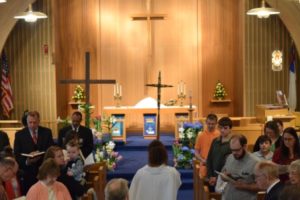Worship with the Saints
Sometimes computers goof things up and place portions of an article in odd places, making them hard to follow. This happened with our August newsletter in the “Worship With the Saints” article. Below is the article, with the words in the right place.
Blessings in Christ,
Pastor
In last month’s “Worship with the Saints” article we mainly considered the Invocation. After the Invocation we move directly into the Confession of Sins and Absolution. The word “confession” means “acknowledgment; avowal; admission.” We actually have two “confessions” in Divine Service 3. First is right after the Invocation and is a confession of our sinfulness. The second time is after the Gospel lesson and is a confession of our Christian Faith (we typically use one of the three “ecumenical” creeds for this).
confession of our Christian Faith (we typically use one of the three “ecumenical” creeds for this).
Scripture teaches that we are born sinful and continue to sin even after we become Christians [Psalm 51:5; 1 John 1:8]. Scripture also teaches that our Holy God is too pure to look upon sin [Habakkuk 1:13]. So we are urged to confess our sins to God and receive forgiveness [1 John 1:8], which is exactly what we do in this preparatory part of the service. Kneeling is historically a position of humility and submission, reflecting our position before God as repentant sinners. While the Pastor leads us in this confession, he also confesses his own sin and thus kneels facing the altar with the congregation. Not everyone is able to kneel, of course. Standing is also fine.
Our confession of our sinfulness begins with three biblical references: Hebrews 10:22; Psalm 124:8; Psalm 32:5. They assure us that, while we are confessing our sins, our Lord and God is favorably disposed towards us. Therefore we need not fear our sins will comeback to haunt us. God bids us come so that he can forgive. [In fact, it is when we do not confess our sins and receive absolution from the Lord that our sins come back to haunt us.]
After we confess our sins we move to the Absolution. With the Absolution we receive forgiveness of our sins. That which separates us from God is absolved. Christ granted this awesome power to his Church when he said, “If you forgive the sins of anyone, they are forgiven; if you withhold forgiveness from anyone, it is withheld” [John 20:22-23]. The Pastor, now speaking for God and the words of God, faces the congregation. After the Absolution we are able to stand in the presence of God and so the congregation rises.
Divine Service 3 provides two different formats for confession of our sins and receiving absolution. The left-hand column is used when the Lord’s Supper is celebrated and the right-hand column is used when we are not celebrating the Lord’s Supper. You can see this distinction in the services found on pages 5 and 15 of The Lutheran Hymnal. The left-hand column is an absolution proper while the right-hand column is a declaration of grace. Because the wording of the left-hand column has the phrase, “I, by virtue of my office, as a called and ordained servant of the Word,” would only be used by ordained pastors. The right-hand column is more generally worded and can appropriately be used by any Christian, say in one’s home.
Over the years many people from a non-Lutheran background have spoken to me about this portion of our service. They have typically had one of two responses. They might object to it, claiming “only God can forgive sins” [Mark 2:7; Isaiah 43:25]. This is, of course, the objection the Jewish leaders raised against Jesus when he forgave sins. It is just as out of place today as in Jesus’ day because of the promise in John 20 quoted above. In our service it is God who is forgiving. He is doing it through his called and ordained minister. The other common response is pure joy. I can’t tell you how many “general” Protestants have told me that they have never before heard, in a worship service, “your sins are forgiven.” They are thrilled to hear, week after week, you are forgiven. Perhaps we long-time Lutherans have lost something of that great thrill.
Next month we will move our attention to the Introit (Communion service) and Psalm (non-Communion service). Until then:
6Oh come, let us worship and bow down;
let us kneel before the LORD, our Maker!
7For he is our God,
and we are the people of his pasture,
and the sheep of his hand. (Psalm 95:6-7)
